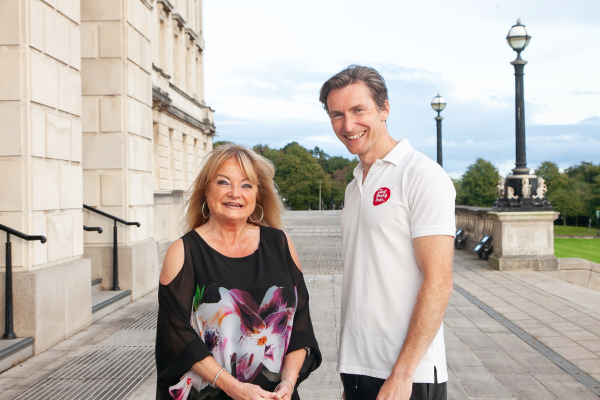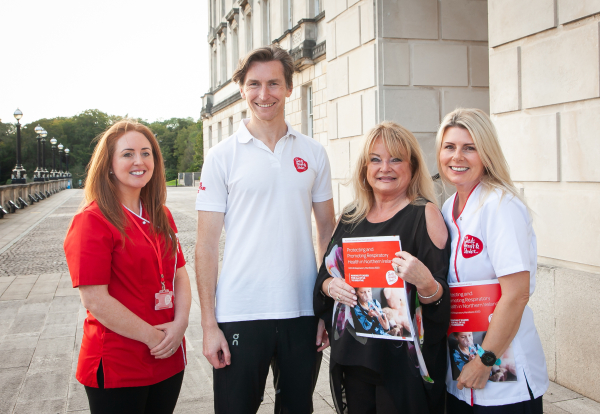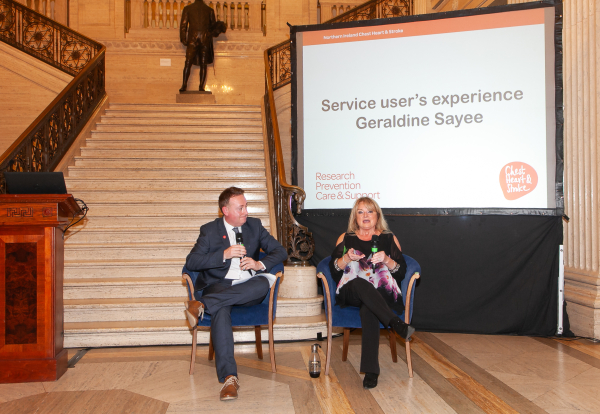
Geraldine Sayee from Belfast was active and busy with a career she loved in Global Pharmaceutical Sales, however in August 2020 she started to feel unwell and had thought it was COVID related: “It started when my sister commented when visiting me that my coughing and breathing were very bad and advised I should go to the doctor.” Geraldine continued: “I hadn’t been feeling well for a while, but I didn’t seek medical advice because I was always so healthy and had no need to follow up until then.”
“It was quite unlike me, but I visited the Out of Hours service where I tested positive for COVID. There wasn’t much to be done, however as I was short of breath, I was given an antibiotic. Unfortunately, this offered little respite. My cough had intensified to the point of nausea. I wasn’t eating and was unusually tired.” Geraldine then chose to see her own GP and was started on a course of stronger antibiotics and steroids. Any relief was short lived, as Geraldine, continued to feel unwell and within weeks had lost her voice due to inflammation of her vocal cords.
Geraldine decided to get a second opinion through her private healthcare plan: “In January 2021 I attended an appointment with a respiratory consultant. Following several tests including a CT scan I was diagnosed with Bronchiectasis.”
She was treated with the mucolytic drug Carbocisteine, additional steroids, given a nebulizer and inhaler. However, Geraldine’s life changed dramatically: “I was due back at work, but I just wasn’t well enough. The cough was really getting me down because I couldn’t sleep. I was both physically and mentally fatigued – when you are used to being very active and healthy, adjusting to a life-changing condition, is most challenging.”
Geraldine took early retirement, struggling to manage low energy levels and a cough which impacted her once very full social life: “I couldn’t walk far and I was embarrassed by my coughing because COVID was still around, and when people heard me coughing, they would walk away or stare intently. I lost confidence when walking because I didn't know when I might become breathless. Bearing in mind that prior to the onset of Bronchiectasis, I would have walked miles every day or every other day.”
Six months after her initial diagnosis, Geraldine was referred to the respiratory multi-disciplinary team at Belfast City Hospital, where she received several supports including sessions with a speech therapist, who mentioned the supports provided by Northern Ireland Chest Heart and Stroke: “I called NICHS and was put through to Gemma Fleming, a Care Services Co-ordinator. At that time, they couldn’t provide home visits because of COVID but she was so much of a support. She talked me through the condition, and then I started attending meetings online during the pandemic. Eventually we were able to meet up in person again, and I attended the Breathing Better programme.”

The NICHS team was able to support Geraldine to manage her condition in a number of ways as she explains: “Previously, my consultant had recommended that I go to Pulmonary Rehabilitation. After waiting a while for the appointment, it emerged that my referral had not been acted upon. Gemma helped me contact the Pulmonary Rehabilitation team and I found myself on the waiting list, which was such a step forward.”
Geraldine then attended the charity’s Taking Control Self- Management programme, a 6-week course run by NICHS under licence from Stanford University which provides individuals living with a long-term condition with a range of skills to help them manage their condition better and improve their confidence. “This completely lifted my spirits. It was empowering to be with people dealing with similar health issues. We developed support networks and lasting friendships. NI Chest Heart and Stroke returned light to my life.”
Speaking about the impact of Bronchiectasis, Geraldine says, “I had just been thrown in the deep end. It really knocked me, for somebody who had been so confident. I've been widowed for 14 years, but I was always in control and able to manage. After my husband died, I threw myself into work. I travelled a lot and had wide and varied friendship groups, but I haven’t been able to travel for almost 4 years now. I hadn’t planned to retire before 70, because I was very active and fit, I try to present myself well, I loved my job, but all of that was taken away. Sadly, I can’t get up and do whatever I want in a day like I used to.”
“I also have two grandsons who are six and eight who love running around in the forest or the park, but I can’t do that anymore. They ask me, ‘Granma, is your voice always going to be like that?’ Before I developed this condition, they would regularly sleep over at my house, but that had to stop. They would get distressed when I would start coughing because they’re very afraid of something happening to me and it scares them to see me having a coughing fit. I miss them staying over terribly.”
“If I’m going out with my friends now, I have to ask to go earlier in the evening. In the winter, I can’t really go out after teatime, because of the effect going out in the cold has on me. It is rather embarrassing if you succumb to a coughing fit in a restaurant, and if you’ve eaten sometimes the coughing makes you feel sick. It is very debilitating, but you wouldn't know it looking at any of us affected.”
“The mucus makes you feel nauseated. You’re must carry lots of boxes of tissues and wet wipes, try to find a bathroom for some privacy, and then after expelling the mucus your eyes are bloodshot and your mascara runs all down your face! It is far from pleasant.”
“Respiratory illnesses are completely misunderstood. People don't realise the impact it has on your daily life. I can't get up and get going quickly in the mornings. I've got to take my time, do my nebulizer, take my carbocisteine tablets, then try to expel the mucus and take my inhalers. I must perform this daily ritual just to function. Whereas when I was well, for work I was so active and busy, often I would have to take Heathrow flight at seven in the morning, so I was up at four, getting myself organised. I was always very hard worker. This condition has changed my life dramatically.”

Geraldine bravely spoke about her experiences at the launch of Northern Ireland Chest Heart and Stroke’s Respiratory Manifesto Document at Parliament Buildings, Stormont, September 2023, urging politicians here to make changes to help those affected by respiratory conditions: “I supported NICHS’s Respiratory Manifesto because I would love to be able to shout from the rooftops about their work, to raise awareness about their services for people who need it. I’m just trying to help those people who have a similar illness, so they don’t feel they’re on their own.”
“Respiratory illness is becoming such an issue in Northern Ireland with air pollution, wood burning stoves, car fumes and more. I never smoked and I've spoken to people at our NICHS meetings with COPD and what strikes me is the number of people attending who have respiratory illness and yet have never smoked. It can happen to anyone.”
“In my experience, you are very much left on your own by the system after diagnosis. I get six monthly appointments to follow up at the hospital. Unless I am admitted to hospital for a flare up, there is nothing else they can really do. NICHS’s services are like a stepping stone or a bridge between primary and secondary care. Respiratory illnesses are looked upon as something that the hospital deals with when you reach a certain threshold. NICHS is there to help you with managing day to day and proactively preventing flare ups.”
“This experience has reinforced my long-held belief that with every cloud there is a silver lining. For me that shimmering thread is NI Chest Heart and Stroke! Thank you to Gemma and to all in NICHS, without your support my cloud would be so much heavier and my life, potentially a lot darker. You are wonderful.”
